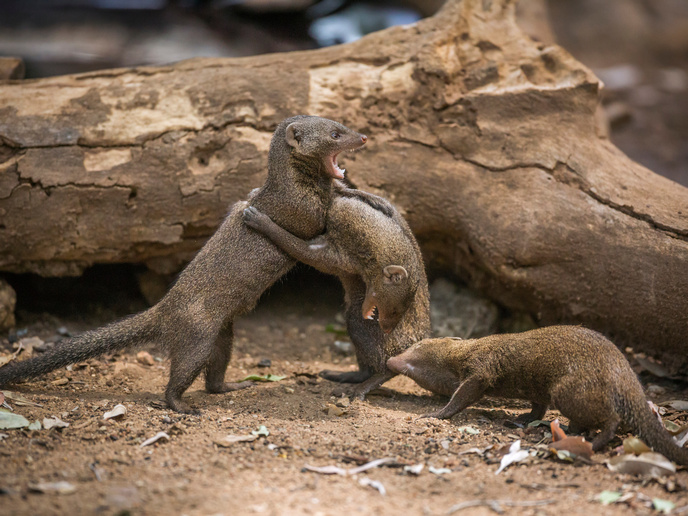Social groups regularly face threats from individuals or rival groups, which can escalate to physical altercations.
“Out-group conflict can alter a group’s behaviours and social structure, whilst also influencing individual survival and reproductive success and over time even cognitive evolution,” explains Andy Radford, coordinator of the EU-funded Outgroup project and winner of the Vice-Chancellor’s Award for Education from the University of Bristol, the project host.
The Outgroup team collected data from a captive population of cichlid fish and a wild population of dwarf mongooses, whilst developing mathematical models to predict responses to out-group conflict.
Some of the project’s work has already featured on Apple TV’s ‘Tiny World’ and on the BBC’s Naturebang series.
Testing times
Outgroup’s captive breeding cichlid fish allowed the team to investigate both short- and long-term consequences of out-group conflict in controlled conditions, while dwarf mongooses offered a rare opportunity for detailed long-term observations in natural conditions. “Because wild groups were habituated to our proximity, we tracked the behaviour and life-histories of individuals throughout their lives,” adds Radford.
A typical experiment with the cichlid fish entailed temporarily placing an ‘outsider’ individual (within a protective container) into the group tank. Following single or repeated intrusions, changes to group-members’ behaviour, hormonal levels and reproduction were observed.
“We demonstrated how intruder and group-member characteristics – such as sex and size – affect post-conflict within-group interactions. We also found that simply having an audience – a neighbouring group – leads to more defensive actions and that chronic out-group threats can compromise the group’s reproduction and offspring survival,” says researcher Ines Braga Goncalves.
The team also described the fitness consequences of out-group conflict, including variation between and within species. Whilst the social intelligence hypothesis had focused on within-group interactions as a driver of brain size, Outgroup suggested that spatial memory, strategic decision-making and numerical assessments related to out-group conflict could be as important.
Experiments with the dwarf mongooses in South Africa included simulating the presence of a rival group, using call playbacks or faecal presentations. Again, changes to behaviours, as well as body-mass and reproduction were observed.
“We showed that out-group conflict can lead to short-term changes in vigilance, grooming and movement but that effects can be lasting, with surprising, potentially positive, reproductive consequences, such as better pup survival,” explains researcher Amy Morris-Drake.
Predictive modelling
Mathematical modelling was used to predict understudied aspects of out-group conflict such as the fitness benefits to group members of fighting intruders. This was modelled and the predictions were then validated in cichlid fish, when intruders were introduced and the defensive contributions of group members recorded.
Intriguingly, in a side experiment, almost the opposite of out-group conflict was observed when paper wasps were found to help nests not their own.
“Evolutionary biology’s Inclusive fitness theory was used to demonstrate that this is driven by diminishing returns to cooperation, but not bet-hedging or indirect reciprocity,” notes researcher Patrick Kennedy, recipient of the Zoological Society of London Thomas Henry Huxley Award and Marsh Prize and the Linnean Society John C. Marsden Medal.
Human implications
Discovering how out-group conflict influences behaviour, hormones, fitness and evolution is crucial to understanding group dynamics, cooperation and sociality.
“Tracing the evolution of sociality to better understand conflict has clear implications for humans, given our propensity for intergroup conflict, most obviously with warfare,” says Radford.
Radford is currently using spatial mapping and movement modelling alongside data and field experiments, to identify strategic dwarf mongoose pre-emptive behaviour that has evolved to ensure success in future conflicts.
The Outgroup project was funded by the European Research Council.
Keywords
Outgroup, conflict, dwarf mongoose, cichlid fish, reproduction, evolutionary, species, behaviour, cognitive, threat

